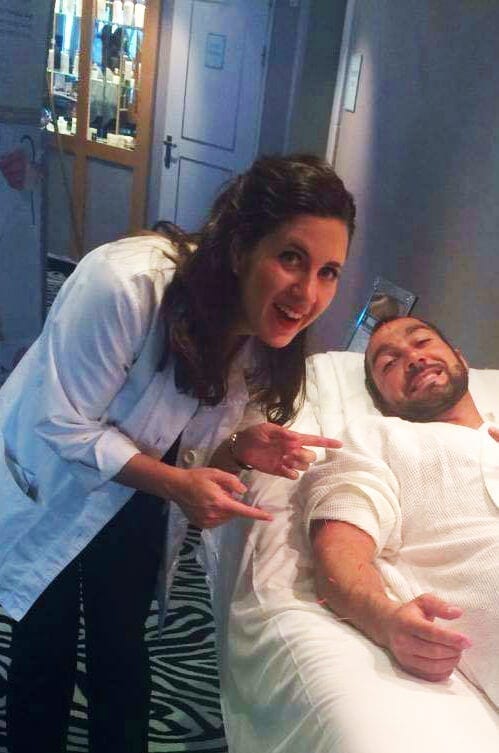After graduating from PCOM in May 2014 with her Master’s in Acupuncture and Oriental Medicine, Karas Smith set out to work as an acupuncturist on board a Royal Caribbean cruise ship.
The Journey to Acupuncture at Sea
What got you interested in doing acupuncture at sea?
I was interested in the idea of working without having to set up your own practice right off the bat. I didn’t know where to settle yet, and the idea of traveling was exciting. Jumping right into the work was also a good plus.
What was it like practicing acupuncture on a cruise?
Parts of the process were easy; the actual practice itself was easy and I felt super prepared. There was more difficulty on the business side. There’s a high demand on you, as the sole acupuncturist, to make the business work. You, and you alone, need to learn very quickly how to deal with managers and supervisors, patient retention, marketing, and everything else. The experience provided a nice overall picture of running a business. The hardest part: patient retention. You only see patients for a week and then they’re gone. You hope that you can inspire them enough to continue the process after they leave, but each week, it was like starting a new practice all over again.
What was your role on the boat? Was it all about acupuncture or did you do other talks, coaching, events?
My role on the cruise was Acupuncturist. There’s only one on board the entire time; I was also the herbalist. Jobs on a cruise ship are based on rank: the higher your rank, the more responsibility you have.
Did you have a daily routine? If so, what was it like?
A sea day, which is when you’re on the sea all day, was a 14-hour shift with two hour-long breaks for lunch and dinner. I’d see 10 to 16 patients and have up to two hour-long seminars where topics such as acupuncture, Chinese medicine education, herbs, and ailments were presented.
Port days were half-days of four to eight hours of work and maybe one seminar or basic, casual meet-and-greet. You have more flexibility to schedule patients and your time off.
Reflections and Insights from a Sea-based Acupuncturist
What did you expect from practicing on a boat and how did it compare to the reality?
Expectation: that the experience would be fun! Travel a lot! Be on vacation!
Reality: Business and sales job first! Commission-based job, so you will need to work to earn your money. Travel does happen, but the business comes first. If you work long hours, you can make your time off worth it. Demand is high, so you can gain great experience, but again, you will need to work for it. You are able to meet people from all over the world, but it is not the vacation that people think it is.
Would you do it again?
Absolutely! Though it was more of a stepping stone into the a business for me than a career.
What did you enjoy about your experience? Was there anything you didn’t?
I enjoyed meeting patients, and the things I got to see and treat. I liked meeting my colleagues, and made some fast and true friends. I also enjoyed the ability to help people out so they can enjoy their time on vacation.
I didn’t enjoy being away from home for so long. Also, the internet was really crappy. You can’t stream or download anything while you’re away at sea. As soon as we got into port, we would find free internet as soon as we could.
Are you interested in becoming a certified acupuncture professional?
Visit the links below to explore our specialized acupuncture programs at a campus near you:
Top Experiences and Patient Care on the Cruise
What were your top 3 favorite things about your time on board?
My first would be the memorable patients–helping them to enjoy their vacation and free time by reducing their pain and minimizing seasickness.
The second would be the sights. The ship had three different home ports, and the skylines of various cities as the boat sailed away were beautiful. Third, the friends I made during the trip, as well as skydiving, and making the most of my time off.
Correct me if I’m wrong, but being on a cruise, I can imagine that you didn’t necessarily work on chronic issues. What were the types of issues you did work on?
A lot of seasickness, obviously, as well as pain (arthritis, herniated discs, etc). IBS, upset stomach, PTSD, and anxiety and stress, especially for people who had trouble getting out of work mode while on vacation, came up often as well. Really though, I was able to see and treat all sorts of things. What made it difficult was not being able to follow up with the patients after their week on the boat, just hoping that I inspired them enough to continue with the healing process after they left.
Do you have any advice for acupuncturists who are interested in doing acupuncture on a boat?
You must be up for an adventure and willing to test your skills as an acupuncturist. It’s definitely a great confidence builder. You really get to know yourself and what you’re capable of.
Featured Posts:

